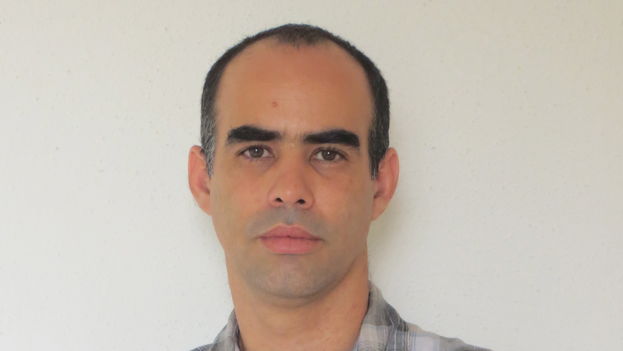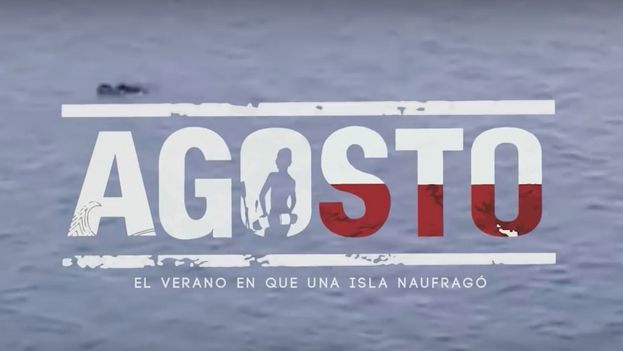
![]() 14ymedio, Yoani Sanchez, Havana, 1 December 2015 — The most recent project of the young filmmaker Armando Capó is to bring to the screen the Rafter Crisis of 1994. This director, born in Gibara (Holguin) in 1979, has long felt that this dramatic movement in our national life has not been publically addressed. Now, he wants to join these images he carries with him from that time and film “August,” a movie to experience the memories.
14ymedio, Yoani Sanchez, Havana, 1 December 2015 — The most recent project of the young filmmaker Armando Capó is to bring to the screen the Rafter Crisis of 1994. This director, born in Gibara (Holguin) in 1979, has long felt that this dramatic movement in our national life has not been publically addressed. Now, he wants to join these images he carries with him from that time and film “August,” a movie to experience the memories.
In the midst of a crowdfunding campaign to bring his project to the big screen, Capó spoke with 14ymedio via email from the San Antonio de Banos International Film School.
This guajirito remembers when he met Marisol Rodriguez, Jorge Luis Sanchez and Dean Luis Reyes at the Gibara Poor Cinema Festival, and they invited him to the third Festival of New Filmmakers in Havana. “They showed us Suite Habana and to me, it gave me an attack and I asked myself why I wasn’t doing what I really wanted or wasn’t trying,” he said. Shortly after, he moved to the capital to continue studying.
Since then his career as a director has led him to address ordinary or extraordinary situations within the documentary genre. “My first documentaries are more casual,” he explains. “Later, through school, watching movies and growing experience, my documentaries became more formal and correct. Each one has a different challenge but they’re not free of errors.” His challenge for the future is to make “documentaries that serve people, not only the director; where the aesthetic is not as important.”
Yoani Sanchez. Among the many interesting issues of the day, why choose for your next film the Rafter Crisis, which occurred more than two decades ago?
Armando Capó. I grew up without the Internet, the only possible source of information were the history books and the media, like the news. In my history book in high school, the Russians had fraternally protected Poland and the Baltic countries during World War II. It may have been true, I did not live it (and we all know what really happened with the pact between Hitler and Stalin). Instead, the Special Period and the rafters is what I experienced. But the media and books didn’t talk about hunger, pain, separation… It was converted into the glorious resistance of the Cuban people to preserve the achievements of our Revolution: The Special Period. When words are used to hide facts.
I cannot understand how there can be induced amnesia in a nation, and I don’t think this helps to heal.
Then there’s the personal: this marked not only the country, but it occurred at the time when I had to move to the city, when I fell in love, and when I had to stop being a child.
Sanchez. How do you think you can cinematically reconstruct an event that has so many verbal references and yet so few published images?
Capó. We have worked hard on finding those images, but more as a reference to build situations. For example, at the end of the film, Carlos accompanies a group of rafters who are preparing their raft just beyond Caletones beach. Hence the images of rafters in the dog’s teeth of Cojimar or in other parts of Havana that serve as well. There are many good photos of the rafts, of how they were made, how they were launched on the sea, etc. But the best are the recordings made by foreign broadcasters, some press agencies, or by some correspondents or individuals. These are very useful for the emotional climate, where you can see the relationships between individuals, the pain, the sounds, and even the prayers.
Sanchez. Why choose the method of crowdfunding to help finance August ?
Capó. Because it is not only a way to get money to make the movie: everything we are doing now to publicize our crowdfunding is also a way of promoting this film on the social networks and in the press.
Our idea is to build a community, to create an audience and the need to see the movie. In Cuba there is no way to distribute it, no one goes to the movie theaters, nor do the theaters generate any return on what is spent on them. In addition, the distribution is very poor quality, which makes the audience not want to go back. How do you reach an audience like this, in a poor country and on top of that one scattered throughout the world. The networks were created for this. The idea is to be able to reach everyone, any possible viewer wherever they are in the world, make the rounds of the festivals and a find a possible opening for streaming.
Now, if it is hard to access the community of Cubans outside Cuba, it seems to us that it is because there isn’t much of a custom among this community of participating in these kinds of campaigns, and it takes time and media support to reach them, because it is a divided community all over the world, with different realities and priorities. We know it is hard, but we also know that it is possible. Right now, if 80 people donate an average of 25 euros, we will make it.
Sanchez. How did you choose the actress Laura de la Uz for one of the protagonists of the film?
Capó. There was no casting process. Laura is a great actress and I needed good actors. I had given some thought to her during the writing process, but nothing definitive. Then I consulted with the producers Marcela Olivera and Claudia Esquivel, and they loved the idea.
I have to confess that I was a little afraid to approach her. But it is because I respect her work so much and then one begins to create a distance that is not real. So much so that I asked Fernando Perez to set up a meeting, like when a school friend sets you up with a cute girl you’re afraid to approach.
Now I think that the first time I tried to get it on with a girlfriend was as clumsy as my first meeting with Laura.
Sanchez. Is the current migration crisis with Cubans stranded in Central America a repeat of the nightmare of the rafters?
Capó. We did not expect this to happen, but in a certain sense it was coming. The number of people who are attempting this route has grown to approach or exceed the dramatic figures of the rafters in 1994, but until now it was in dribs and drabs so it didn’t have the visibility of 20 years ago. It may serve to comfort to all the countries Cubans are passing through in their journey that it is Costa Rica that is best able to address this crisis.
My question is: Will crossing the border of Nicaragua eliminate the problem? How can their route to the US be protected? Can they pass? There are many testimonies of kidnapped migrants, of families that need to be ransomed, or threats that they will receive pieces of their families until they get the money. I think this is the beginning of a possible tragedy whose consequences we can’t foresee.

Sanchez. In the last few months the need for a Film Law has been strongly debated in Cuba, what do you think?
Capó. The country has changed and is becoming more pragmatic on the one hand and more blind on the other. Symptomatic of this is the announcement that cultural production has dropped to 0.5% of gross domestic product. The austerity policy that is applied to culture is reaping its rewards and they are not good. It is like the recipe the International Monetary Fund applies to member countries to reduce their fiscal deficit.
I would like to see Cuba as a place that has enormous potential thanks to its culture, a virgin territory. But if we are not capable of protecting that culture against the coming changes, this cultural patrimony that generates industry, then we are not thinking about the future, much less the present. It is irresponsible to maintain that attitude.
Besides, there is a real need to regulate current film production, to democratize access to financing, to create laws to protect those who make movies, not only among ourselves but also with regard to those who use our country as a stage. The ICAIC (Cuban Film Institute) as an institution is rooted in a way of thinking and making movies that is, at the least, archaic, and that is not capable of taking on the role as the representative of Cuban cinema.
For me, a Film Law goes far beyond the necessary restructuring of the audiovisual industry. I would like to see in it a a premonition of the kind of relationship we should have in Cuba, of civic responsibility to participate in proposals and solutions. That is why this proposal is so subversive, because it creates a precedent for what an opinion group and a guild can create. The proposal for horizontal citizen participation, which for so long has not happened in our country.
